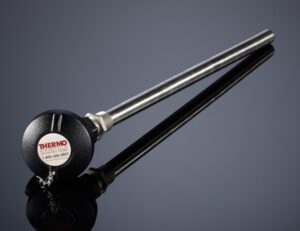 A guide to choosing the right thermocouple, by Thermo-Kinetics: Essential factors for temperature sensing
A guide to choosing the right thermocouple, by Thermo-Kinetics: Essential factors for temperature sensing
September 13, 2023 REDWIRE is news you can use from leading suppliers. Powered by FRASERS.
Posted by Thermo-Kinetics Measurement & Control Ltd.
For over 50 years, Thermo-Kinetics has stood out from the competition in offering the North American industry the best o... Read more
Subscribe
Free REDWIRE e-newsletter

Thermo-Kinetics carries various thermocouples.
In various industrial, scientific, and engineering applications, accurate temperature measurements play a critical role in ensuring the efficiency, safety, and reliability of processes and systems. Thermo-Kinetics thermocouples offer a cost-effective and robust solution for measuring temperature across a wide range. However, selecting the right thermocouple for a specific application can be challenging, due to the plethora of options available. We will guide you through the essential factors to consider when choosing the right thermocouple for your needs.
- Temperature Range: One of the most important considerations when choosing a thermocouple is the temperature range it will be exposed to. Different thermocouple types are designed to work optimally within specific temperature ranges. The American National Standards Institute (ANSI) has categorized thermocouples into various types based on their temperature ranges, from low to high. For instance, type K thermocouples are suitable for a wide range of temperatures (-200°C to +1260°C), while type J thermocouples are suitable for a more limited range (-40°C to +750°C). Choose a thermocouple type that can accurately measure temperatures within your application’s operating range.
- Sensitivity and Accuracy: Thermocouples exhibit different sensitivities, which refers to their output voltage change per degree Celsius (mV/°C). For precise temperature measurements, consider the thermocouple’s sensitivity and accuracy. Generally, type S and type R thermocouples have the highest sensitivity and accuracy, making them suitable for high-precision applications. On the other hand, type T and type K thermocouples are less sensitive but are still commonly used for general-purpose temperature measurements.
- Chemical Compatibility: The environment in which the thermocouple will be used is a critical factor to consider. Ensure that the thermocouple material is compatible with the chemicals and substances present in the application’s surroundings. Some aggressive environments may cause rapid degradation of certain thermocouple types, leading to inaccurate measurements or even sensor failure. For example, type E thermocouples are more resistant to oxidation and corrosive environments, while type N thermocouples are highly stable in high-temperature and oxidizing atmospheres.
- Response Time: In applications that require rapid temperature changes to be detected, the thermocouple’s response time becomes crucial. The response time is the time it takes for the thermocouple to reach approximately 63.2 per cent of the total temperature change. Smaller diameter thermocouples typically have faster response times. If your application involves quick temperature fluctuations, consider using a thinner thermocouple with lower thermal mass.
- Mechanical Strength and Durability: The physical environment can impose mechanical stress on the thermocouple, affecting its longevity and performance. For instance, in industrial applications, the thermocouple might be exposed to vibrations, shocks, or mechanical impacts. Choose a thermocouple that has the necessary mechanical strength and robustness to withstand such conditions and maintain accurate temperature readings over time.
- Cost and Budget: As with any decision, the cost is a crucial factor. Different thermocouple types have varying costs due to their material composition and manufacturing processes. While some applications might require high-end and expensive thermocouples for precision, others can function perfectly well with more affordable options. Strike a balance between the required accuracy and the available budget.
Selecting the right thermocouple from Thermo-Kinetics is a critical step in ensuring accurate and reliable temperature measurements for your application. Consider factors such as temperature range, sensitivity, chemical compatibility, response time, mechanical strength, and cost before making your choice. By understanding the specific requirements of your application, you can confidently choose the most suitable thermocouple type that will provide consistent and precise temperature data, ultimately improving the overall efficiency and safety of your processes and systems.
Contact Us
If you are interested in our process measurement and control solutions, including thermocouples, please contact us to discuss your requirements. Our experienced personnel will be happy to assist you in selecting the right solution for your application.
https://thermo-kinetics.com/ask-us/
Share
Posted by Thermo-Kinetics Measurement & Control Ltd.
For over 50 years, Thermo-Kinetics has stood out from the competition in offering the North American industry the best o... Read more
